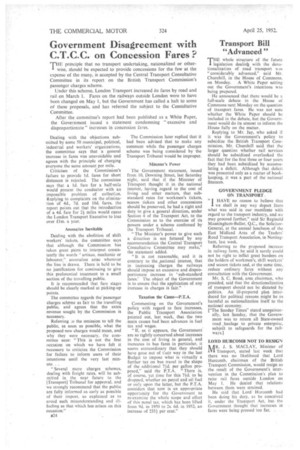Government Disagreement with C.T.C.C. on Concession Fares ?
Page 62

If you've noticed an error in this article please click here to report it so we can fix it.
THE principle that no transport undertaking, nationalized or other wise, should be expected to provide concessions for the few at the expense of the many, is accepted by the Central Transport Consultative Committee in its report on the British Transport Commission's passenger charges scheme.
Under this scheme, London Transport increased its fares by road and rail on March 1. Fares on the railways outside London were to have been changed on May 1, but the Government has called a halt to some of these proposals, and has referred the subject to the Consultative Committee.
After the committee's report had been published as a White Paper, the Government issued a statement condemning "excessive and disproportionate" increases in concession fares.
Dealing with the objections submitted by some 50 municipal, political, industrial and workers' organizations, the committee says that a general increase in fares was unavoidable and agrees with the principle of charging everyone the same amount per mile.
Criticism of the Commission's failure to provide id. fares for short distances is rejected. The committee says that a Id. fare for a half-mile would present the conductor with an impossible problem of collection. Replying to complaints on the eliminati-on of 4d., 7d. and 10d. fares, the report points out that the introduction of a 4d. fare for 24 miles would cause the London Transport Executive to lose over Elm. a year.
Anomalies Inevitable Dealing with the abolition of shift workers' tickets, the committee says that although the Commission has taken great pains to interpret consistently the words artisan, mechanic or labourer,", anomalies arise wherever the line is drawn. There is held to be no justification for continuing to give this preferential treatment to a small section of the travelling public.
It is, recommended that fare stages should be clearly marked at picking-up points.
The committee regards the' passenger charges scheme as fair to the travelling public, and agrees that the extra revenue sought by the Commission is necessary.
Referring o the omission to tell the public, as soon as possible, what the proposed new charges Would mean, and why they were necessary, the committee says: "This is not the first occasion on which we have felt it necessary to criticize the Commission for failure to inform users of their intentions until the very last minute. .
" Several more charges schemes, dealing with freight rates, will be submitted in the near future to the [Transport] Tribunal for approval, and we strongly recommend that the public are fully informed as early as possible of their import, so explained as to avoidsuch misunderstanding and ill feeling as that which has arisen on this occasion."
B24 The Commission later replied that it had been advised that to make any comment while the passenger charges scheme was being considered by the Transport Tribunal would be improper.
Minister's Power
The Government statement, issued from 10, Downing .Street, last Saturday night, said that if the Minister of Transport thought it in the national interest, having regard to the cost of living and other matters, that substandard rates for workmen's tickets, season tickets and other concessions should be preserved, he had a right and duty -to give a general direction, under Section 4 of the Transport Act, to the Commission as to the exercise of its powers under a scheme confirmed by the Transport Tribunal.
"The Minister's power to give such a direction is not fettered by any recommendation the Central Transport Consultative Committee may make," the statement added.
"It is not reasonable, and it is contrary to the pational interest, that in increasing charges the railways should impose an excessive and disproportionate increase in 'sub-standard fares.' The object of the Government is to ensure that the application of any increase in charges is fair." '
Taxation the Cause—P.T.A.
Commenting on the Government's policy with regard to fare increases, the Public Transport 'Association pointed out, last week, that the two . main causes had been advances in fuel tax and wages.
"if, as it appears, the Government are so rightly concerned about increases in the cost of living in general, and increases in bus fares in particular, it seems extraordinary that they should have gone out of tieir way in the last Budget to impose what is virtually a further tax on bus travel in the shape' of the additional 74d. per gallon proposed," said the P.T.A. "There is, of course, yet time for this 74d. to be dropped, whether on petrol and oil fuel or only upon the latter, but the P.T.A. considers that now is an appropriate opportunity for the Government to re-examine the whole scope and effect of this rscnal tax, which has been lifted from 941. in 1950 to 2s. 6d. in 1.952, an increase of 2331 per cent."




























































































































































































































